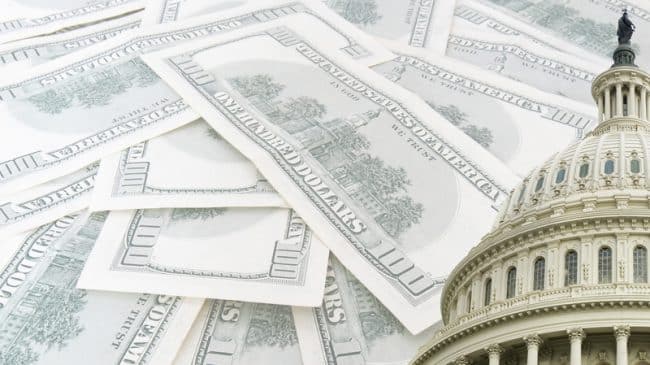Previous: 14. Tax Cuts > Taxpayer’s Guide > Next: Conclusion
Summary: This section of the stimulus outlines the new laws and regulations established for the governance of the stimulus money, for Congress, and for Wall Street.
>> The Major Provisions
- Spending End Dates
- Section 1603. All of the money authorized in the stimulus bill must be spent by September 30, 2010, unless an exception was given. Unspent funds must be returned to the Treasury Department.
- Section 1602. At least half of the money given to any government or agency for infrastructure spending must be used by June 17, 2009 (120 days after the signing of the stimulus). According to this chart from Recovery.org, the deadline was met in March 2009.
- Buy America Clause
- Section 1605. Any stimulus money used for construction or building maintenance must use materials made in the United States, unless that increases the cost of the project by more than 25 percent or is somehow inconsistent with the public interest.
- Davis-Bacon Requirements
- • Section 1606. Davis-Bacon refers to a law by that name which says the minimum wage for a job should be what the current union wage rate is. This standard is not always applied, but the stimulus bill says that “Davis-Bacon” employment requirements must be met for any job created by stimulus money.These wage requirements are going to create a significant problem for many of the firms that want to hire new employees through a stimulus-funded program. The compensation rules mean that, for example, a non-union construction firm may be able to hire two workers with its current resources, but having to pay wages based on a local union’s level means it can only afford to hire one person. Unions negotiate with specific companies and industries based on the resources of those employers. Outside employers, who have different resources, should not be required to meet those standards. It only hurts business and reduces employment. In a similar way, executive pay limits are driving talented individuals from the financial industry into other firms where they can be paid a competitive wage.
- Recovery.gov
- Section 901. As previously outlined in the bill, the U.S. Comptroller (essentially the accountant for the Federal government) will post reports on the use of stimulus money and ensure the Recovery Board follows all regulations.
- Executive Compensation
- Title VII. Executives at firms that receive money from the Troubled Asset Relief Program are not allowed to receive severance packages, and have the amount of their compensation limited based on position in the firm and how much Federal money they have received. However, shareholders of a firm do have some ability to override this limit.This section of the stimulus has been reconsidered several times since its passage in February. The most recent proposed amendment is the Pay for Performance Act, which would give the Treasury Secretary oversight of the compensation of any employee at a firm that has been bailed out by the government, all the way down to bank janitors. Limits on executive compensation and bonuses will be a part of the administration’s financial sector overhaul plan later in 2009.
- Governor Requirement
- Section 1607. Governors can decline some or all of the stimulus money. However, if they do the state legislature is authorized to override their decision and take the money.In South Carolina, Governor Mark Sanford rejected money for unemployment insurance and education on grounds that the money would ultimately increase the state’s deficit. The South Carolina legislature demanded that he accept the $700 million their state would have received for education funding, though the governor said he would only do so if equivalent cuts were made elsewhere in the budget. The legislature refused and passed a budget accepting the money anyway, taking the case to the state’s high court.
On June 5, the South Carolina Supreme Court ruled that the governor had no jurisdiction to reject the money, making a significant statement about executive authority in the state. The decision and clause in the stimulus also make a significant statement about state’s rights and federal authority. If the federal government can require that state’s increase their deficits, then what other autonomy will Washington D.C. claim?
- No Animals Were Harmed During the Making of this Stimulus
- Section 1604. None of the money authorized by the stimulus can be used for a casino, aquarium, zoo, golf course, or swimming pool.
- Economic Downturn Study
- Section 5008. The bill commissions the Government Accountability Office to study how the economic downturn has affected the states, and provide the Federal government with a report for how to address state budget needs by April 1, 2011.
>> Government Recovery Websites
American Recovery and Reinvestment Act Website: http://www.recovery.gov/
Previous: 14. Tax Cuts > Taxpayer’s Guide > Next: Conclusion
Written by: Anthony Randazzo. Please email with any comments or corrections.
